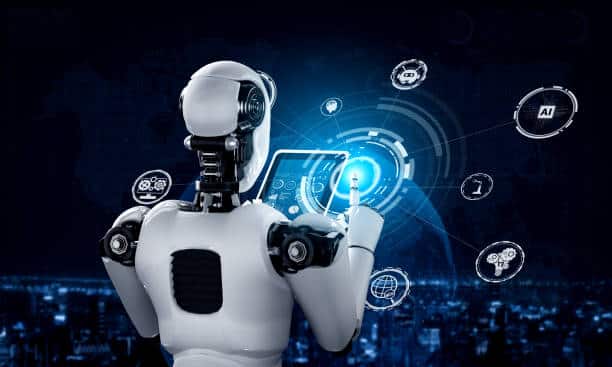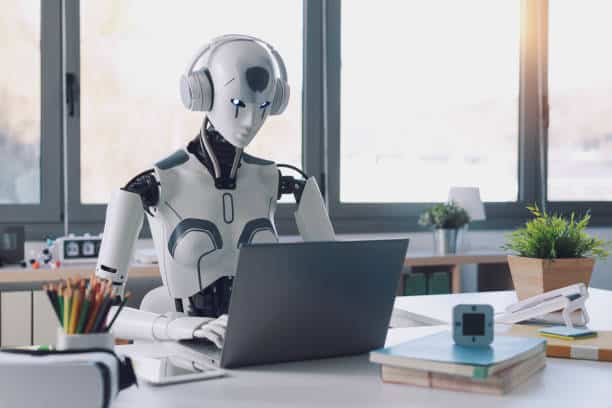Many businesses are experiencing a massive change in the way work is done, due to the integration of human-generated logic (simulated intelligence) into mechanized processes. This innovation doesn’t just smooth out errands, but additionally raises concerns about the ultimate fate of the workforce. From expanded efficiency and effectiveness to potential job relocation, the impact of human intelligence on mechanization is undeniable. Understanding this shift is essential for both businesses and agents as they explore the progressive work scene.
Basic Learnings:

- AI-driven automation: AI is changing the ultimate fate of work by automating tedious operations and cycles, allowing reps to zero in on key, higher-value exercises.
- Expanded efficiency: Computerization controlled by computer-based intelligence improves operational efficiency, reduces errors and speeds up processes, causing further developed efficiency in the work environment.
- Jobs in a new position: While human intelligence mechanizes secure businesses, it also creates new jobs that require human skills, for example, imagination, critical thinking and the ability to value anyone at a deep level, with the importance of upskilling and reskilling in the workforce.
Reassessing jobs with simulated intelligence
Clearly, the reconciliation of anthropomorphic logic (computer-based intelligence) in different ventures is reshaping jobs and responsibilities. Robotization is changing the landscape of work, expecting unions to rethink the contractual elements of representatives.
Converting from Hands-on to AI-based Jobs
Manual engagements that are boring and tedious are eliminated as human-made frameworks based on intelligence take over. These frameworks can handle large amounts of information with speed and accuracy that surpass human capabilities. Employees are able to focus on more creative and strategic aspects of their work as a result of this transition, which leads to increased productivity and job satisfaction.
Additionally, AI can handle complex assessments and surveys, enabling organizations to quickly pursue more educated choices. By uploading joint operations to simulated intelligence, agents can devote their opportunity to quests that require decisive logic and critical thinking abilities, ultimately upgrading progress within the association.
Upskilling the Workforce for an Artificial Intelligence Time
Upskilling the workforce is key to agent planning for the intelligence simulation period. It includes providing education and training to help them use AI tools effectively and adapt to changing job demands. Continuous learning and improvement are important to stay relevant in an arguably robotic workforce.
Re-evaluating jobs by upgrading the professions of future proof agents as well as committing them to use simulated intelligence for further enhanced productivity and execution. Investing in upskilling programs ensures their workforce is valuable in the AI revolution and fosters a culture of growth and adaptability.
Simulation of intelligence and direction

Obviously, anthropogenic brainpower (anthropogenic intelligence) has been a unique asset in mechanization change, particularly with regard to dynamic cycles in organisms. The ability of simulated intelligence to examine vast measures of information and constantly follow informed choices has profoundly affected the way associations operate and plan for what’s next.
Information-driven management
An important part of computer-based intelligence in navigation is its ability to empower information-driven management. Using advanced computing and artificial intelligence processes, human intelligence can filter through monstrous data sets to identify patterns, patterns, and connections that may not be apparent to human leaders. As a result, businesses are able to make decisions that are more accurate and well-informed because they can do so based on objective data as opposed to intuition or guesswork.
Upgrading Business Techniques with Proactive Research
The board can harness the power of artificial intelligence to improve business methodologies through proactive review. By using authentic information and applying calculations to calculate future patterns and results, associations can anticipate market changes, customer trends and potential risks. This proactive methodology allows organizations to improve their tasks, mitigate risks and exploit potential open doors, giving them the upper hand in the fast-paced business scene.
Examining plays an important role in turning raw information into valuable experiences that drive core direction. With the ability to process and decipher massive amounts of data at astonishing speeds, AI empowers organizations to make coordinated choices and rapidly adapt to changing business elements. By integrating screening into their work processes, compounds can stay on the ball and position themselves for a supportive effect in advanced age.
Ethical considerations of human intelligence in robotics

Finding the right balance between work and efficiency
Ethical considerations regarding the implementation of simulated intelligence in automation revolve around the harmony between efficiency and work.
While AI technologies have the potential to reduce costs, improve productivity and streamline processes for businesses, there is growing concern about how they might affect human jobs.
As additional tasks are mechanized, workers may face uprooting and job uncertainty. It is urgent for unions to carefully consider the ethical implications of computer-based intelligence-based robotics and find proactive ways to limit the adverse effects on their workforce.
Protection and Safety in a robotic work environment
To address ethical concerns involving safety and security in a robotic work environment, associations should focus on information assurance and access control measures. AI frameworks amass massive measures of sensitive data, raising questions about who accesses that information and how things are used.
Organizations must implement strict network security conventions and guarantee simplicity in information collection and usage practices to defend worker protection and prevent security breaches.
The challenge of balancing the benefits of AI automation with the protection of individual rights and job security lies somewhere between the constant pursuit of efficiency and the ethical responsibilities employers have to their employees.
Associations that explore this sensitive trade-off wisely and honestly will not just equip AI’s maximum innovation ability, but additionally maintain ethical rules that come on the line for work.
Final Words
With these considerations in mind, it is clear that artificial intelligence and computerization are fundamentally reshaping the ultimate fate of work. To remain competitive and efficient, businesses must adapt to technological developments.
Increasing productivity, enhancing decision-making, and improving customer experiences are all possible outcomes of adapting to these changes and utilizing the capabilities of AI. If a company wants to succeed in the ever-changing workplace, it needs to be proactive in incorporating artificial intelligence into its operations.

